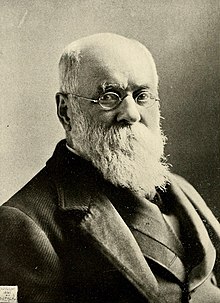Charles Anderson Dana
| Charles Anderson Dana | |
|---|---|
 |
|
| Born |
August 8, 1819 Hinsdale, New Hampshire |
| Died | October 17, 1897 (aged 78) Long Island, New York |
| Occupation | Journalist Newspaper editor |
| Relatives | Ruth Draper (granddaughter) |
| Signature | |
Charles Anderson Dana (August 8, 1819 – October 17, 1897) was an American journalist, author, and senior government official. He was a top aide to Horace Greeley as the managing editor of the powerful Republican newspaper New York Tribune until 1862. During the American Civil War, he served as Assistant Secretary of War, playing especially the role of the liaison between the War Department and General Ulysses S. Grant.
He at first appealed to working class Democrats but after 1890 became a champion of business-oriented conservatism.
Dana was born in Hinsdale, New Hampshire on August 8, 1819. He was a descendant of Richard Dana, progenitor of most of the Danas in the United States, who emigrated from England, settled in Cambridge in 1640, and died there about 1695. At the age of twelve, Charles Dana became a clerk in his uncle's general store at Buffalo, until the store failed in 1837. At this time, he began the study of Latin grammar, and prepared himself for college. In 1839 he entered Harvard, but the impairment of his eyesight forced him to leave college in 1841. He also abandoned his intentions to study in Germany and enter the ministry. From September 1841 until March 1846 he lived at Brook Farm, where he was made one of the trustees of the farm, was head waiter when the farm became a Fourierite phalanx, and was in charge of the Phalanx's finances when its buildings were burned in 1846. During his time with Brook Farm, he also wrote for the Transcendental publication, the Harbinger. In 1846, he married widow Eunice MacDaniel.
Dana had written for and managed the Harbinger, the Brook Farm publication, devoted to social reform and general literature. Later, beginning 1844, he also wrote for and edited the Boston Chronotype of Elizur Wright for two years. In 1847 he joined the staff of the New York Tribune, and in 1848 he wrote from Europe letters to it and other papers on the revolutionary movements of that year. In Cologne he visited Karl Marx and Ferdinand Freiligrath. (From 1852 to 1861, Marx was one of the main writers for the New York Daily Tribune).
...
Wikipedia
